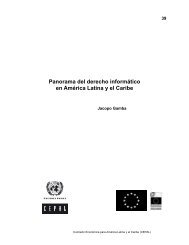Palabras en juego
Palabras en juego
Palabras en juego
You also want an ePaper? Increase the reach of your titles
YUMPU automatically turns print PDFs into web optimized ePapers that Google loves.
Al mom<strong>en</strong>to de su acceso (marzo 2011) <strong>en</strong> el website del libro no hay versión <strong>en</strong><br />
español de este artículo. Hay traducciones al francés y al portugués<br />
Derechos humanos<br />
Rikke Frank Jørg<strong>en</strong>s<strong>en</strong><br />
The concept of human rights in the information society involve compreh<strong>en</strong>sion of<br />
two key phrases; human rights and the information society.<br />
Linking a legal tradition to a vaguely defined policy concept<br />
Human rights draw on deep and widespread historical roots since practically all<br />
cultures, religions, and philosophies include human rights principles, though they<br />
also contain practices which are incompatible with human rights. However, one<br />
important date for placing it on the international ag<strong>en</strong>da is December 10, 1948<br />
wh<strong>en</strong> the Universal Declaration of Human Rights (UDHR) was adopted at the UN<br />
G<strong>en</strong>eral Assembly in the aftermath of the Second World War to <strong>en</strong>sure that such<br />
horror would never again occur. The UDHR has since be<strong>en</strong> developed into a large<br />
body of international conv<strong>en</strong>tions and declarations, some of them legally binding,<br />
others political statem<strong>en</strong>ts, which UN member states commit to follow in their<br />
national legislation and practice. [1]<br />
In the following, human rights are referred to as defined in the Universal<br />
Declaration of Human Rights, the International Cov<strong>en</strong>ant on Civil and Political<br />
Rights, and the International Cov<strong>en</strong>ant on Economic, Social and Cultural Rights,<br />
as civil and political rights of citiz<strong>en</strong>s, as well as their economic, cultural, and social<br />
rights. At the 1993 UN World Confer<strong>en</strong>ce on Human Rights held in Vi<strong>en</strong>na, the<br />
international community reaffirmed the four principles that lie at the heart of the<br />
human rights regime: human rights are universal (rights belong to all persons),<br />
indivisible (rights cannot be separated from one another), interrelated (rights<br />
impact upon one another) and interdep<strong>en</strong>d<strong>en</strong>t (a right cannot be fully achieved<br />
without fulfilm<strong>en</strong>t of all other rights) [2].<br />
The term information society has academic roots dating back to the mid-sev<strong>en</strong>ties<br />
[3] but was politically revitalized by the American and European project to privatize<br />
and liberalize the telecommunication sector globally. In 1994, Al Gore as the US<br />
Vice Presid<strong>en</strong>t, announced the creation of “the Global Information Infrastructure”,<br />
echoed at the European level in a number of white papers and reports in the mid-<br />
¬nineties, the most famous of which was the Report of the Bangemann High Level<br />
Expert Group in 1994. In official rhetoric the many political, economic, sci<strong>en</strong>tific,<br />
and social changes related to globalization and communication infrastructure soon



